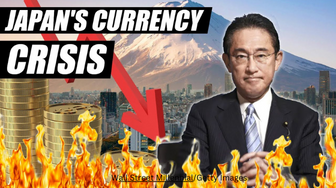There are serious concerns about the collapse of the Japanese Yen, growing inflation, and the Bank of Japan’s difficulties, which could be dangerous for the world economy as well as Japan. It is described as being marked by growing debt, inflation, and a declining currency (the Yen). It’s possible that the Bank of Japan’s attempts to manage its economic problems are failing and that there will soon be another devaluation of the yen. As Japanese investors withdraw their money, this depreciation can cause a liquidity crisis that could impact international markets. In order to prevent this possible crisis, the BOJ highlights the necessity of international cooperation and stresses the significance of keeping an eye on Japan’s interest rate policies.
The following is a synopsis of the main ideas from the given text:
Yen Collapse and Inflation: The Japanese yen is severely depreciating in value. In a brief amount of time, the Federal Reserve’s sequence of interest rate hikes has caused the Yen to lose significant value relative to the US dollar. A depreciating yen raises import costs and has multiple negative implications on Japan’s economy.
Monetary Policy and Yield Curve Control: Japan has been using a monetary policy known as “yield curve control” since 2016. This strategy entails purchasing bonds at an infinite rate in order to lower yields and increase spending. The Japanese government sells its government bonds directly to the Bank of Japan (BOJ).
Increased Yields and Debt Monetization: In spite of the BoJ’s attempts to manage the yield curve, 10-year Japanese bond yields have increased dramatically to 0.775%. A significant amount of recently issued bonds are also being purchased by the central bank, a practice similar to debt monetization.
Japan is facing both demographic and economic issues as a result of a smaller workforce and dropping birth rates. consumption has decreased as a result of this demographic problem, and the BOJ’s attempts to increase consumption have not been very successful.
Customer Perception of Inflation: Japanese consumers perceive greater costs than official data suggest. The recorded 3.3% rate of inflation is much lower than the perceived rates. Prices are significantly higher, especially for necessities like food and gasoline, according to consumers.
Real Wage Decline: For 17 straight months, real earnings in Japan have decreased. Household budgets are under pressure as a result of rising prices, particularly when salaries aren’t keeping up.
Trade Deficits: Japan’s imports of products exceed its exports, resulting in a trade imbalance. The yen’s decline has made matters worse, raising the cost of imports and causing trade imbalances.
Effects of Yen Devaluation on Inflation: Higher inflation is being caused by a weaker yen and rising oil prices as a result of geopolitical events such as the recent conflict in Israel. As a result, Japan faces challenges in trying to manage inflation without negatively impacting the economy.
Japan’s options: Japan is in a difficult situation. A worldwide economic slowdown that would impact not only Japan, but the entire world might result from the BOJ’s decision to raise interest rates in order to fight inflation and bolster the yen. However, there may come a moment at which Japan’s current monetary policy cannot be continued and the Yen is allowed to sink even further.
Global Systemic Risk: If Japanese investors begin to repatriate their funds and overseas bond holdings as a result of a stronger Yen, then Japan’s monetary and economic circumstances could constitute a systemic risk to the world economy.
To summarize, policymakers are facing tremendous hurdles due to Japan’s economic and monetary issues, as well as a declining value of the yen and increasing inflation. The nation must make tough choices about its exchange rates and monetary policy that could have a significant impact on the global economy as well as Japan.
Follow us on social media: Instagram, Threads & Twitter @nya360_ YouTube & Facebook @nya360





